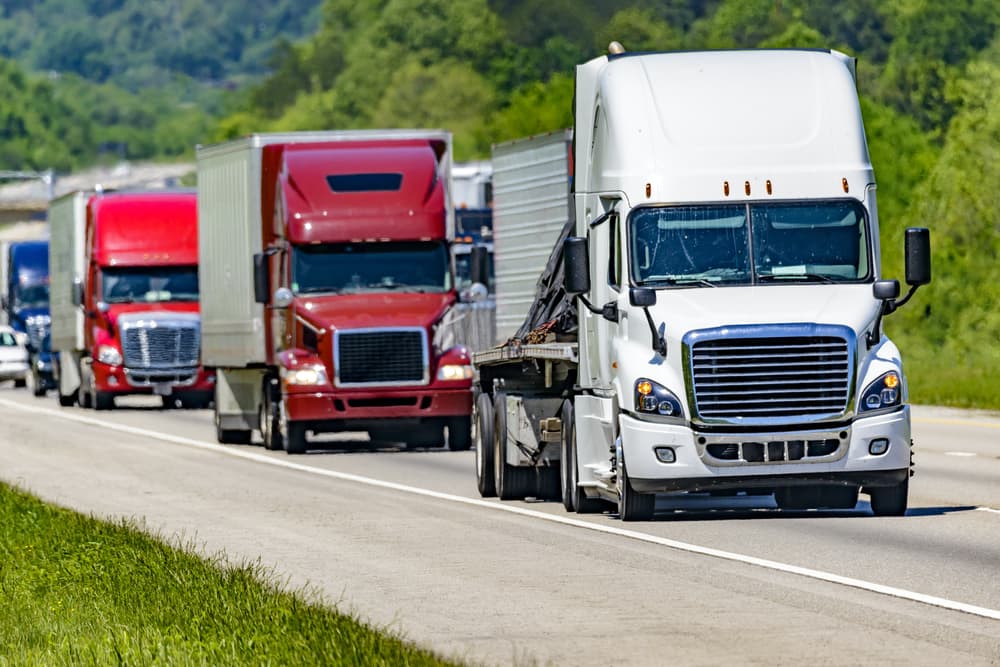Serious injuries can result when a large and heavy rig, tractor-trailer, or 18-wheeler collides with a smaller vehicle. Sometimes, when truck drivers are negligent, they leave the scene of an accident. In that situation, accident victims can take legal action against the trucking company or be eligible to file an uninsured motorist claim with their own insurance carrier.
If you sustained injuries in a truck accident where a driver left the scene, you must consult a truck accident lawyer in your area as quickly as possible. Your lawyer can review your legal options and take appropriate steps to pursue the monetary recovery you deserve for your injuries.
How Negligent Truck Drivers Cause Accidents

Negligent truck drivers are often the instigators of various road accidents, leading to many consequences for all parties involved. One prevalent scenario is the rear-end collision, where a truck fails to maintain a safe following distance due to the driver's negligence. This lapse in judgment can result in catastrophic outcomes, as the immense size and weight of trucks amplify the impact, causing severe damage to the vehicle in front.
Another common type of accident involves lane departure, where negligent truck drivers, perhaps distracted or tired, drift out of their designated lanes. This reckless behavior significantly heightens the risk of collisions with adjacent vehicles, often leading to sideswipes or more serious accidents when drivers abruptly attempt to correct their course.
Negligent truck drivers also contribute to a substantial number of intersection collisions. Disregarding standard traffic laws, including ignoring traffic signals, failing to yield the right-of-way, or speeding through intersections, these drivers create hazardous situations that frequently result in collisions with other vehicles. The consequences of such accidents can be particularly dire, often involving multiple vehicles and causing significant injuries.
Some truck drivers engage in aggressive driving behaviors in their pursuit of meeting tight schedules. This can manifest in unsafe overtaking, tailgating, or sudden lane changes. Aggressive driving by truckers endangers themselves and puts other motorists at considerable risk, leading to a higher likelihood of accidents.
Parking lot accidents involving trucks are another consequence of negligence. Drivers not cautious while maneuvering through crowded parking areas may collide with other vehicles or pedestrians. The confined spaces amplify the potential for damage and injury, turning parking lots into zones of heightened risk when truck drivers are not diligent.
Furthermore, negligent truck drivers are frequently involved in jackknife accidents. These incidents occur when a truck's trailer swings outward, forming a ninety-degree angle with the cab. Such situations often result from abrupt braking or turning at high speeds, indicating a lack of driver control.
Injuries in Truck Accidents
Truck accidents stemming from driver negligence inflict a harrowing toll, leaving victims grappling with profound physical and mental consequences. The sheer size and weight of trucks intensify the effects of collisions, resulting in severe injuries for those involved. Physical consequences often include fractures, spinal injuries, and traumatic brain injuries, the latter contributing to potential long-term cognitive impairments. The aftermath of such accidents often requires extensive medical interventions, surgeries, and prolonged rehabilitation, imposing a significant physical burden on survivors.
Beyond the immediate physical trauma, truck accidents can induce lasting mental health challenges. Survivors often grapple with post-traumatic stress disorder (PTSD) triggered by the horrifying experience of the collision. Flashbacks, nightmares, and heightened anxiety become pervasive, impeding the ability to resume normal life. Survivors of truck accidents are not the only ones to suffer mental scars; witnesses, including first responders and bystanders, may also experience lingering psychological trauma.
For those who lose loved ones in truck accidents, the emotional toll is immeasurable. Grief and bereavement become enduring companions, often accompanied by feelings of anger and helplessness. The sudden and violent nature of truck accidents can shatter families, leaving them to navigate a complex emotional landscape while also dealing with the practical challenges of loss.
In addition, the financial burden resulting from truck accidents can compound the stress on survivors. Medical bills, rehabilitation costs, and potential loss of income due to disabilities create a formidable financial strain. The ramifications of truck accidents resonate beyond the individual, affecting families, communities, and even the broader healthcare system.
Truck accidents can also erode trust in the safety of our roadways, creating a pervasive fear among motorists. The mental toll of constantly navigating a landscape where the potential for a catastrophic collision looms can lead to heightened stress levels and a diminished sense of security for all road users.
Addressing the physical and mental consequences of truck accidents requires a multifaceted approach. Beyond medical interventions, comprehensive support systems for survivors, including mental health resources and financial assistance, are crucial. Preventative measures, such as stringent enforcement of safety regulations and driver training programs, play a pivotal role in mitigating the devastating consequences of truck accidents due to negligence.
Legal Options If a Truck Driver Leaves the Accident Scene
If a negligent truck driver causes an accident and then flees the scene, pursuing legal options becomes essential for victims seeking recourse. In such situations, the first step is to contact law enforcement immediately. Reporting the hit-and-run accident establishes an official record of the incident and initiates an investigation. Gathering as much information as possible about the truck, including license plate numbers, company markings, and any identifying details, can prove instrumental in identifying the responsible party.
Simultaneously, seeking medical attention promptly is crucial. Even if injuries initially seem minor, obtaining a thorough medical evaluation is essential for documenting potential long-term consequences. Medical records become pivotal evidence in establishing the extent of damages the negligent truck driver caused.
Once law enforcement is involved, their investigation may lead to identifying the truck driver. However, if the driver remains elusive, victims can explore legal avenues through their insurance. Uninsured motorist coverage, a component of many insurance policies, can provide compensation for injuries and property damage resulting from a hit-and-run accident involving a negligent truck driver.
Engaging legal representation is another critical step for victims seeking justice. An experienced personal injury attorney can navigate the complexities of hit-and-run cases, assisting in gathering evidence, negotiating with insurance companies, and exploring potential legal actions against the responsible party. Once authorities have identified the truck driver, pursuing a personal injury lawsuit becomes viable, seeking compensation for medical expenses, lost income, pain and suffering, and other damages.
In hit-and-run cases involving a negligent truck driver, victims may also explore the possibility of holding the trucking company accountable. If the driver was operating within the scope of employment, the company could be liable for their employee's actions. Establishing the employer's liability requires carefully examining the employment relationship and adherence to safety regulations within the company.
The legal options available depend on the specific circumstances of the hit-and-run accident. Consultation with a legal professional is paramount to understanding the best action. Through a combination of law enforcement cooperation, insurance claims, and potential legal actions, victims of hit-and-run accidents that negligent truck drivers cause can strive to obtain the compensation they deserve and hold the responsible parties accountable for their actions.
Evidence Necessary to Prove a Hit-and-run Truck Accident Claim
In a truck accident case where the negligent driver flees the scene, gathering compelling evidence becomes imperative for the accident victim to establish liability and damages.
One pivotal piece of evidence is eyewitness accounts. Identifying individuals who witnessed the accident and obtaining their statements can provide crucial perspectives on the events leading up to the collision. Eyewitness testimony can strengthen the victim's case by offering independent and unbiased insights into the truck driver's negligent actions.
Furthermore, obtaining and preserving physical evidence from the accident scene is essential. This includes photographs of the damaged vehicles, skid marks, and any debris scattered on the road. Such visual evidence reconstructs the sequence of events and can be instrumental in determining fault. Preserving the physical evidence promptly is vital as the accident scene may undergo changes or cleanup that can compromise its evidentiary value.
Police reports constitute another crucial element in establishing liability. The responding law enforcement officers document their observations, gather witness statements, and may include preliminary findings about the cause of the accident. Obtaining a copy of the police report provides an official account of the incident, offering valuable support when pursuing legal action against the negligent truck driver.
Medical records and professional testimony play a pivotal role in establishing damages. Seeking prompt medical attention and maintaining detailed records of injuries, treatments, and associated expenses creates a comprehensive record of the physical toll the accident inflicted. Medical professionals can provide professional testimony, linking the injuries directly to the truck accident and offering insights into the long-term repercussions on the victim's health.
Vehicle maintenance and inspection records of the negligent truck driver's vehicle are critical in demonstrating any mechanical failures or lapses that may have contributed to the accident. The claimant can obtain these records through the trucking company or relevant authorities, and these documents can serve as evidence of the truck driver's responsibility for ensuring the safe operation of their vehicle.
Exploring technological evidence is also essential in hit-and-run cases involving a negligent truck driver. Surveillance footage from nearby cameras, traffic monitoring systems, or even toll booth records may capture the fleeing truck or provide additional insights into the accident's circumstances.
By compiling a comprehensive array of evidence, including eyewitness accounts, physical evidence from the scene, police reports, medical records, and vehicle maintenance records, the victim in a hit-and-run truck accident case can strengthen their position when establishing liability and demonstrating the extent of damages incurred. This multifaceted approach enhances the likelihood of obtaining fair compensation and holding the negligent truck driver accountable for their actions.
Monetary Compensation as Part of a Hit-and-run Truck Accident Claim

In a truck accident claim or lawsuit where the negligent driver flees the scene, victims may pursue several types of monetary compensation to address the damages incurred. These include economic, non-economic, and punitive damages.
Economic Damages
- One primary category is economic damages, which encompasses tangible and quantifiable losses directly resulting from the accident. This includes medical expenses, from initial emergency care to ongoing treatments and rehabilitation. Victims are eligible for compensation for both past and future medical costs, ensuring they can access the necessary healthcare to recover from the injuries sustained in the truck accident.
- Lost income constitutes another facet of economic damage. If the victim's injuries prevent them from working, they are eligible to recover the income lost during the recovery period. Additionally, if the injuries lead to a diminished earning capacity or disability that affects future income, the victim may pursue compensation to address these long-term financial implications.
- Property damage is another tangible economic loss that victims can recover. This includes the repair or replacement costs for the damaged vehicle and any personal property. Victims can seek compensation for the financial burden of restoring or replacing their damaged belongings.
Non-economic Damages
- Beyond economic damages, victims can pursue non-economic damages to address intangible losses resulting from the truck accident. Pain and suffering, both physical and emotional, are significant components of non-economic damage. The enduring pain, trauma, and emotional distress the accident caused warrant compensation, acknowledging the profound effects on the victim's overall well-being.
- Loss of consortium is another non-economic damage that the victim may pursue in cases where the truck accident results in the loss of companionship, support, or intimacy within familial relationships. Spouses or family members affected by the victim's injuries may seek compensation for the disruptions to their relationships.
Punitive Damages
The claimant may seek punitive damages in cases involving egregious negligence or intentional misconduct. These damages punish the responsible party and deter similar conduct in the future. However, the availability of punitive damages varies by jurisdiction and requires specific circumstances to warrant their inclusion in the compensation awarded.
By seeking a comprehensive range of monetary compensation, including economic, non-economic, and, in some cases, punitive damages, victims of truck accidents that negligent drivers who leave the scene have caused can address the full spectrum of losses incurred. This approach ensures that individuals facing the aftermath of a hit-and-run truck accident have the means to recover financially, physically, and emotionally from the devastating repercussions of the collision.
Contact a Truck Accident Lawyer in Your Area Today
Suppose you suffered injuries in a truck accident where a negligent driver left the scene. In that case, you need to retain an experienced personal injury attorney to represent you in your case as quickly as possible. Your attorney can promptly investigate your accident circumstances and file a claim on your behalf with the appropriate insurance company. Your lawyer can then pursue the favorable monetary damages you need for your truck accident injuries through negotiation or litigation in the state court system.



